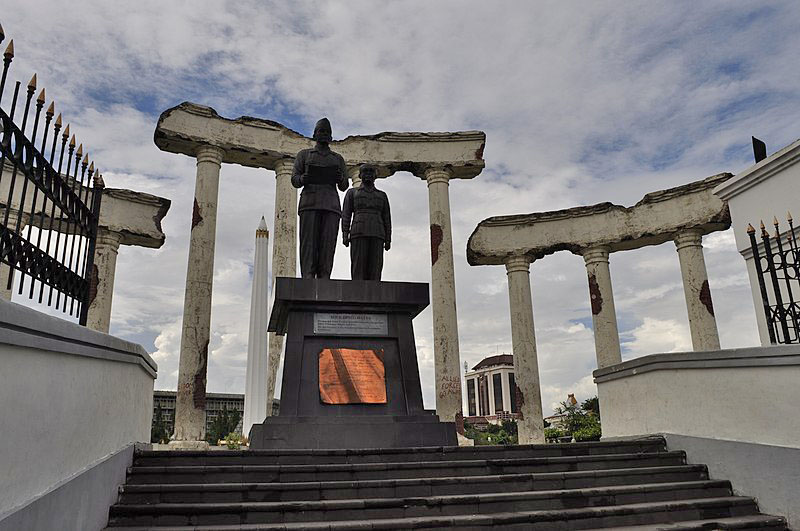Surabaya’s Javanese “Egalitarianism”: Why It Matters for Democracy
Javanese society is known for its high-context culture. In cultural studies, high-context culture is defined as a type of culture in which communication between people tends to rely on being implicit and indirect, and in the form of symbols, signs, gestures, and clues. High-context culture is “a culture that prioritises group harmony and well-being over individual achievement.” 1 High-context culture features a common ground for the Javanese people. However, within this broader cultural context, Surabaya embraces a distinctive cultural vibe that fosters a more democratic atmosphere within Javanese society.
While Java is often characterised as feudalistic and aristocratic, the way culture is practised is not monolithic, and internal variations exist. Ayu Sutarto, for instance, identified various cultural sub-regions (known as tlatah) within East Javanese society. 2 These are characterised by distinctive systems of religion, community organisation, knowledge, livelihood, economics, language, art, and technology. This demonstrates that Javanese society is plural and dynamic. These sub-cultures include the Mataraman culture, which represents a stratified and feudalistic society as a result of the Mataram Kingdom’s influence; the Madura Island culture, which exhibits frankness, durability, and to some extent, resistance; Pandhalungan, which is associated with the successful acculturation of Javanese and Madurese cultures in the eastern part of East Java; and the Pangarekan culture, which dominantly encompasses the city of Surabaya and surrounding areas. The inhabitants of this area who embrace its culture are popularly labeled as Arek Surabaya, which literally translates into the “Folk of Surabaya.” In a more technical context, the term also refers to those who follow the values, practices, and ways of life associated with the people of Surabaya.
The Arek culture in Surabaya and the egalitarian spirit
In Surabaya, the Pangarekan or Arek culture is distinctive. Abdillah, 3 Winiasih, 4 Jauhari 5 and Sriyanto and Fauzie 6 have significantly studied the Arek culture. Historically, the Arek culture originated from a village community characterised by its egalitarianism, openness, democracy, and high levels of solidarity. The term arek is derived from the Old Javanese language ari-ika, which means “younger brother/child.” However, the term's meaning has been culturally transformed to encompass the qualities of courage, fearlessness, and unwavering resolve.

Fig. 1: Tugu Pahlawan (Heroes Monument) in Surabaya, Indonesia. [Photo courtesy of Wikimedia Commons user Ivuvisual and reprinted under Creative Commons license, 2016).
Furthermore, the Arek culture also appears to exhibit a less pronounced hierarchical structure. For example, the relationship between children and parents is characterised by a high degree of fluidity. Most children and adolescents in Surabaya utilise the ngoko language (used by peers) when conversing with their seniors. Accordingly, the culture of Surabaya is also distinguished by the common use of swear words, which other cultures may perceive as offensive. Expressions such as jancuk, cuk, hancik, jancik, jangkrik, and diamput are commonly used to express closeness among comrades. These swearing words employ a model that refers to various things and do not always express anger. Instead, they may also express regret, sadness, disappointment, admiration, humiliation, surprise, intimacy, or humor, among other things. The utilisation of swearing language, particularly in expressing disillusionment, indignation, and rejection of political decisions that contravene the people's will, exemplifies the Arek culture's endorsement of people’s capacity to challenge social norms.
How does the Surabayan culture impact the democratic culture in Javanese society? In general, it can be said that the distinct cultural character of Arek Surabaya has allowed independent actions and democratic public participation both in social, political, and economic dynamics. Moreover, it has been able to provide the social capital that enables society to have a healthy democratic culture.

Fig. 2: A crowd in front of a large house, presumably some kind of revolt, in Surabaya, circa 1900-1910. [Photo courtesy of Royal Netherlands Institute of Southeast Asian and Caribbean Studies (KITLV) and Leiden University Library via Wikimedia Commons, Public Domain.]
Politically, in this democratic and egalitarian culture, Arek Surabaya is actively involved in supporting, monitoring, or rejecting government policies, especially those relating to the organisation of public spaces. The degree of democracy within a region can be gauged by the extent of public participation. Unlike other Javanese societies, the Arek Surabayaculture, which has traditionally encouraged a high degree of freedom, actively shapes public spaces in the people’s favor.
Economically, the distinct culture of Surabaya has triggered public economic initiative. This can be observed in the trend of urbanisation since 1967. They have played a pivotal role in transitioning from a subsistence economy to an urban economy, by establishing “home-based businesses” in kampung-kota (urban-village), which specialise in a diverse range of products, including bag embroidery, clothing, and cakes.
Furthermore, Arek Surabaya utilise public land for their people’s needs and as an additional source of income for the community. Private landowners attempt to lease their unused land to fish farmers in exchange for one-third of the profits, allowing the farmers to benefit from fish sales. They also utilise the city's parks, which now number approximately 100, as places for meeting, trading, playing, and other socialising activities. Another initiative has focused on processing waste materials to create economic value. This is achieved through the establishment of 663 waste banks across the city, which successfully allowed most residents in Surabaya to have access to waste banks. This is a positive development for democracy and citizen participation in the organisation of urban space.
Surabaya stands out as a distinctive culture within the broader Javanese society. It is characterised by egalitarianism, openness, and democracy, which have positively impacted increased public participation across various social, political, and economic domains.
Pradana Boy Zulian is a Visiting Fellow at Regional Social and Cultural Studies, ISEAS Yusof Ishak, Singapore. He is also an Associate Professor in Islamic Legal Studies, University of Muhammadiyah Malang in Indonesia. Email: pradana@umm.ac.id